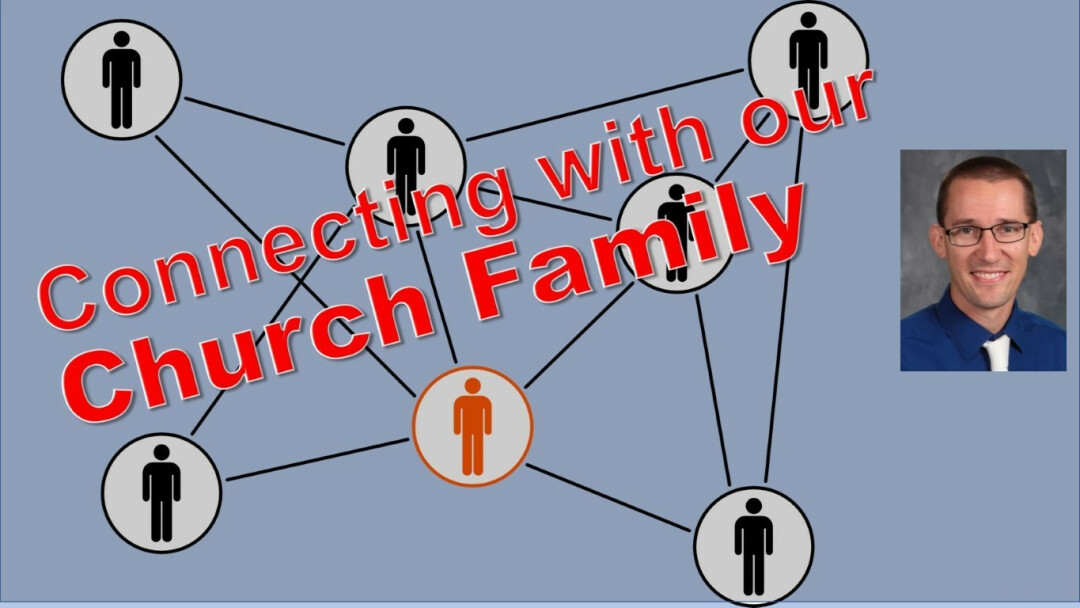Connect with Our Church Family
2020-21 Ministry Year Focus: "Connected in Faith"
- Connecting with God - Drawing near with a true heart.
Let us draw near with a true heart in full assurance of faith, with our hearts sprinkled clean from an evil conscience and our bodies washed with pure water. (Hebrews 10:22) - Connecting with our Church Family - Holding fast the confession of our hope.
Let us hold fast the confession of our hope without wavering, for he who promised is faithful. (Hebrews 10:23) - Connecting with our Community - Stirring up one another to love & good works.
And let us consider how to stir up one another to love and good works. (Hebrews 10:24)
This month we take another look at the second theme of our ministry year focus, as we contemplate what it looks like to “Connect with our Church Family – Holding fast the confession of our hope” (see #2 above).
There are many things that try to pull us apart as a church. We face external and internal forces that in subtle and not-so-subtle ways try to drive divisions into our midst. We face external forces that range from the busyness of modern life to the ease of our mobility through technology and travel, from the pressures of life in a politicized world to the preferences of an increasingly individualistic society. But we also face internal forces as well. Divisions can arise from our differing worship preferences to our opposing opinions in our responses to the current pandemic realities to our personal perspective of how our faith informs our vocation in the world.
These trials are nothing new. The church has always wrestled with the struggles of life within a sinful world. The author of Hebrews, however, directs our focus not to what may divide us but to the essence of what draws the church together—our confession of hope (Hebrews 10:23). It is our confession of who Jesus is that draws us as the church together from various backgrounds, diverse perspectives, differing political parties, and a variety of personal life stories. It is the unified confession of who Jesus is that draws us to one another. More and more we hear the concern that many in our time are withdrawing from wider community engagement into fewer and fewer personal connections only with people who look like them, act like them, and think like them. The church, on the other hand, is meant to be a place of unity, not uniformity. The church is meant to be a place where we learn and grow from our collective experience, not just our individual perspective.
In C.S. Lewis’ book The Screwtape Letters two evil tempters converse with one another about how to lead a recently converted man away from his newfound faith. The following words are insightful, “In the first place the parochial organization [of the church] should always be attacked, because, being a unity of place and not of likings, it brings people of different classes and psychology together in the kind of unity the Enemy desires. The congregational principle, on the other hand, makes each church into a kind of club…” The church, however, is more than a club, we are a people united in our shared faith in Jesus. We are a part of a community that has transcended time and space and culture, for Christ alone is the one who draws us together in His forgiving love and gracious sacrifice on our behalf. As we hold fast together, on our confession of this faith, we reflect upon what it means to be “His” church.
“The faith that connects Christians together in the community is always personal but never private.” — Tim Mackie
“A church community can only be changed in degree to the proximity in which its members are drawn into relationship with God. It is only as we are changed by the unconditional love and acceptance of the Lord that we can begin to love and accept those around us.” — Unknown
“I want to be a part of a community with the habits and practices that will make me do what I would otherwise not choose to do and then learn to like what I have been forced to do.” — Stanley Hauerwas
— Pastor Kurt Ebert


